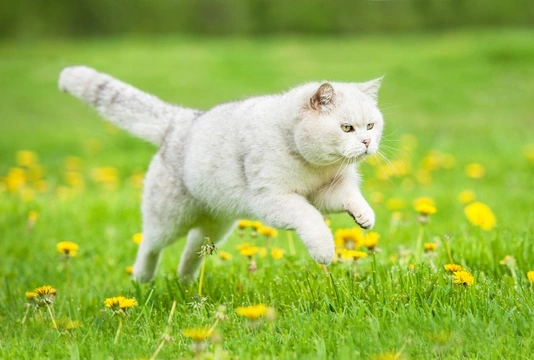
Understanding the cat’s prey drive
The term “prey drive” essentially means “hunting instinct” and is used to describe the level of natural interest that any given animal has in hunting for their own live prey. You may well have heard the phrase used in relation to dogs, when comparing breeds-for instance, sighthound breeds can fairly be considered to have a very high prey drive, and will instinctively pursue, catch and kill smaller animals.
The prey drive is something that is instinctive in cats as well as dogs, and potentially, to an even greater extent-whilst dogs can usually be trained to curb their prey drive (and so, live safely with cats, or follow a command to return to their owner when called) the same is not usually true for cats.
Even for cats that do not hunt or show any meaningful interest in chasing toys for fun, were humans to become extinct tomorrow and leave our domestic cats to fend for themselves, even the laziest and most sedentary of cats is likely to soon remember their instincts and be able to hunt successfully.
It is a good idea for anyone who owns a cat or that is considering getting one to learn a little bit about the prey drive of the cat, why it is present, and why they hunt even when well fed. In this article, we will aim to explain the prey drive of the cat in more detail, and provide some insight into this side of feline evolution and behaviour. Read on to learn more.
Prey drive is an evolutionary trait
The instinctive, innate nature of the cat is that of a hunter, which is why even very old and lazy cats can often be convinced to chase after a piece of string, and why cats are able to fend for themselves in the wild by catching their own food.
Hunting for prey is something that mother cats teach their kittens naturally, even if the mother cat herself has never had to hunt for food and is not particularly interested in chasing things-she will still teach her litter the basics of hunting and stalking prey, and this happens from a very young age.
However, even hand-reared kittens or those that are not shown how to hunt have the ability to do so, and many cats that are prolific hunters today simply begun to hunt of their own volition, without ever being shown how to!
You can see a lot of instincts at work when you watch a cat stalking something; the still pose of lying poised in wait, the butt-wiggle as they prepare to pounce, and the chattering, cheeping sounds that some cats make when they have caught something!
Domestic cats retain a strong prey drive
Even though our pet cats are well fed and most have never known what it is like to miss a meal, many cats will still hunt, demonstrating the instinctive nature of the prey drive even when it is not related to the need to find food. You may even find that your cat might love to catch things, but will show absolutely no interest in eating them-they have satisfied their natural urge in the chase, and that is enough!
Cats as providers
In the wild, a mother cat would bring prey back to her litter for food, and also, to begin to teach them how to hunt. As the kittens get a little older, the mother cat may begin bringing back live prey, to teach the kittens about making the kill, and to reinforce their instinctive drive to hunt.
When a cat catches something, they are generally proud of it, and will want the other cats (and people) in the house to appreciate how well they did. The fanfare associated with a successful hunt and the presentation of it to you is all part of the experience, and has some parallels with the way that a mother cat will bring prey back to her kittens.
If your cat is keen on bringing you “presents,” they are showing their regard and respect for you, and also, worrying that you are not any good at hunting for yourself-they are trying to encourage you to hunt, and letting you know that they will feed you if you cannot do it yourself!
For this reason, telling your cat off or being disgusted by their offerings is counterproductive-your cat will simply think that they need to try harder next time!
Does play reinforce the prey drive?
Most of the games that cats like to play involve chasing and catching something, which appeals to their innate prey drive and desire to hunt. It may therefore seem that playing with your cat in this way will reinforce their prey drive and make them more likely to hunt, but the opposite is usually the case.
If you allow your cat an outlet for their need to hunt by playing with them, this may curb their need to find their own prey-and of course, ensuring that they always have food available, and like what is on offer can help a lot too!



